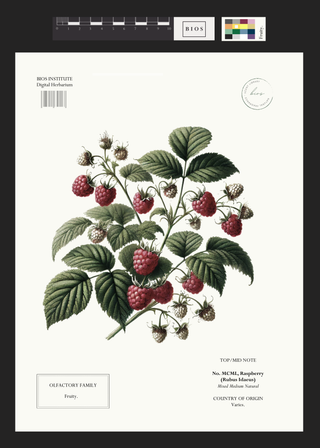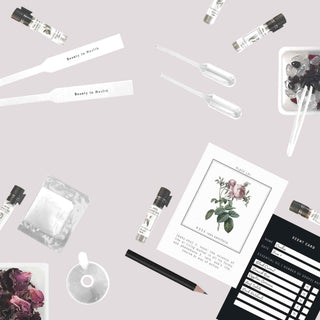

Rubus idaeus, commonly known as the raspberry, is native to several regions in Europe and northern Asia. Its exact native range includes parts of Eastern Europe, including countries such as Russia, Ukraine, and Belarus, as well as regions of northern Asia, including China and Mongolia.
Raspberries have a long history of cultivation and wild gathering in Europe and Asia, where they have been enjoyed for their delicious and nutritious fruits. Over time, raspberries have been introduced to other parts of the world, including North America, South America, and other temperate regions, where they are now also cultivated and enjoyed. Ours is sourced from various countries.
Raspberry provides a fresh and fruity scent that is reminiscent of ripe berries. Its aroma is often described as sweet, juicy, tangy, and slightly floral. It can range from delicate and subtle to rich and intense, depending on the concentration and other ingredients used in the fragrance.
Raspberry is used to create fruity accords in perfumery, adding a vibrant and mouthwatering quality to fragrances. It is commonly combined with other fruits such as citrus, peach, strawberry, or blackberry to enhance their natural sweetness and create a more complex scent. It is a Top/Middle note found in our Fruity family.
Raspberry is frequently used in gourmand fragrances, which are perfumes that feature sweet and edible notes. It adds a delectable, dessert-like quality to fragrances and can be paired with vanilla, caramel, chocolate, or creamy notes to create a luscious and indulgent scent.
Raspberry is often used in feminine fragrances due to its sweet and romantic characteristics. It can bring a youthful and playful vibe to floral compositions, making it a popular choice in floral fruity perfumes targeted towards women.
Raspberry is a versatile note that can be used in a variety of fragrance types, including eau de toilette, eau de parfum, and body mists. Its bright and uplifting aroma makes it suitable for both daytime and evening wear, as well as different seasons.
Raspberries are commonly associated with Midsummer celebrations in certain cultures, particularly in Nordic countries. Midsummer is a traditional festival that marks the summer solstice, typically celebrated on or around June 21st. During this time, raspberries are in season, and their sweet and juicy berries are an integral part of the festivities. Here are some aspects of raspberry use during Midsummer:
Midsummer is a time when wild raspberries are ripe and ready for harvest. People often venture into forests or gather in gardens to pick fresh raspberries. It is a communal activity where families and friends come together to enjoy the outdoors and collect the berries. The freshly picked raspberries are then used in various culinary preparations.
Raspberries are used in a variety of culinary delights during Midsummer. They are often enjoyed fresh as a standalone treat or incorporated into desserts, cakes, tarts, jams, and pies. Traditional Midsummer dishes such as berry pies, raspberry-filled pastries, and berry-infused beverages showcase the vibrant flavor and color of raspberries.
Raspberries are seen as a symbol of summer abundance and fertility. Their bright red color and luscious taste represent the vitality and vibrancy of nature during this season. In some folklore and traditions, the act of picking and consuming raspberries during Midsummer is believed to bring good luck, prosperity, and protection against evil spirits.
Raspberries are also used for decorative purposes during Midsummer celebrations. They may be used to adorn tables, wreaths, and floral arrangements. The vibrant red berries add a festive and joyful touch to the overall ambiance.
In Nordic folklore, raspberries are sometimes associated with love and romance. It was believed that if a young, unmarried person ate raspberries on Midsummer's Eve, they would dream of their future spouse. This tradition added an element of romance and mystique to the celebration.
Raspberry
- Unit price
- /per
Please note this product format is a small vial that contains roughly 20 drops of scent concentrate. This can be purchased à la carte but is intended to be used with our Perfume Kit.
SCENT SPECIFICATIONS
Latin Name: Rubus Idaeus
Extraction Method: Isolate
Country of Origin: Varies
All of the scents in our library are naturally derived - our collection includes essential oils, absolutes, concretes, isolates, enfleurage, macerations, oleoresins, and mixed medium naturals.
Adding product to your cart
Rubus idaeus, commonly known as the raspberry, is native to several regions in Europe and northern Asia. Its exact native range includes parts of Eastern Europe, including countries such as Russia, Ukraine, and Belarus, as well as regions of northern Asia, including China and Mongolia.
Raspberries have a long history of cultivation and wild gathering in Europe and Asia, where they have been enjoyed for their delicious and nutritious fruits. Over time, raspberries have been introduced to other parts of the world, including North America, South America, and other temperate regions, where they are now also cultivated and enjoyed. Ours is sourced from various countries.
Raspberry provides a fresh and fruity scent that is reminiscent of ripe berries. Its aroma is often described as sweet, juicy, tangy, and slightly floral. It can range from delicate and subtle to rich and intense, depending on the concentration and other ingredients used in the fragrance.
Raspberry is used to create fruity accords in perfumery, adding a vibrant and mouthwatering quality to fragrances. It is commonly combined with other fruits such as citrus, peach, strawberry, or blackberry to enhance their natural sweetness and create a more complex scent. It is a Top/Middle note found in our Fruity family.
Raspberry is frequently used in gourmand fragrances, which are perfumes that feature sweet and edible notes. It adds a delectable, dessert-like quality to fragrances and can be paired with vanilla, caramel, chocolate, or creamy notes to create a luscious and indulgent scent.
Raspberry is often used in feminine fragrances due to its sweet and romantic characteristics. It can bring a youthful and playful vibe to floral compositions, making it a popular choice in floral fruity perfumes targeted towards women.
Raspberry is a versatile note that can be used in a variety of fragrance types, including eau de toilette, eau de parfum, and body mists. Its bright and uplifting aroma makes it suitable for both daytime and evening wear, as well as different seasons.
Raspberries are commonly associated with Midsummer celebrations in certain cultures, particularly in Nordic countries. Midsummer is a traditional festival that marks the summer solstice, typically celebrated on or around June 21st. During this time, raspberries are in season, and their sweet and juicy berries are an integral part of the festivities. Here are some aspects of raspberry use during Midsummer:
Midsummer is a time when wild raspberries are ripe and ready for harvest. People often venture into forests or gather in gardens to pick fresh raspberries. It is a communal activity where families and friends come together to enjoy the outdoors and collect the berries. The freshly picked raspberries are then used in various culinary preparations.
Raspberries are used in a variety of culinary delights during Midsummer. They are often enjoyed fresh as a standalone treat or incorporated into desserts, cakes, tarts, jams, and pies. Traditional Midsummer dishes such as berry pies, raspberry-filled pastries, and berry-infused beverages showcase the vibrant flavor and color of raspberries.
Raspberries are seen as a symbol of summer abundance and fertility. Their bright red color and luscious taste represent the vitality and vibrancy of nature during this season. In some folklore and traditions, the act of picking and consuming raspberries during Midsummer is believed to bring good luck, prosperity, and protection against evil spirits.
Raspberries are also used for decorative purposes during Midsummer celebrations. They may be used to adorn tables, wreaths, and floral arrangements. The vibrant red berries add a festive and joyful touch to the overall ambiance.
In Nordic folklore, raspberries are sometimes associated with love and romance. It was believed that if a young, unmarried person ate raspberries on Midsummer's Eve, they would dream of their future spouse. This tradition added an element of romance and mystique to the celebration.
